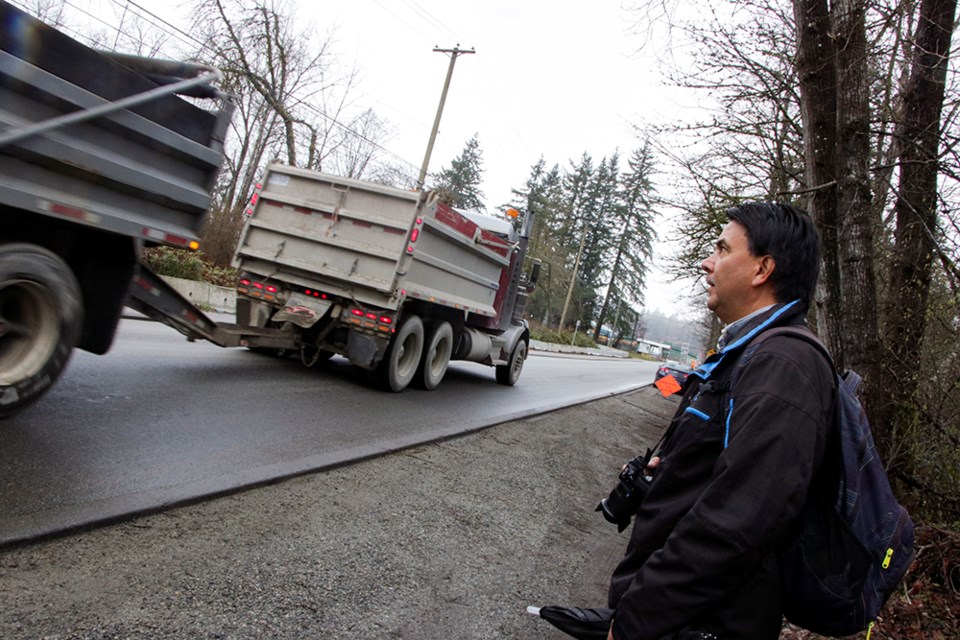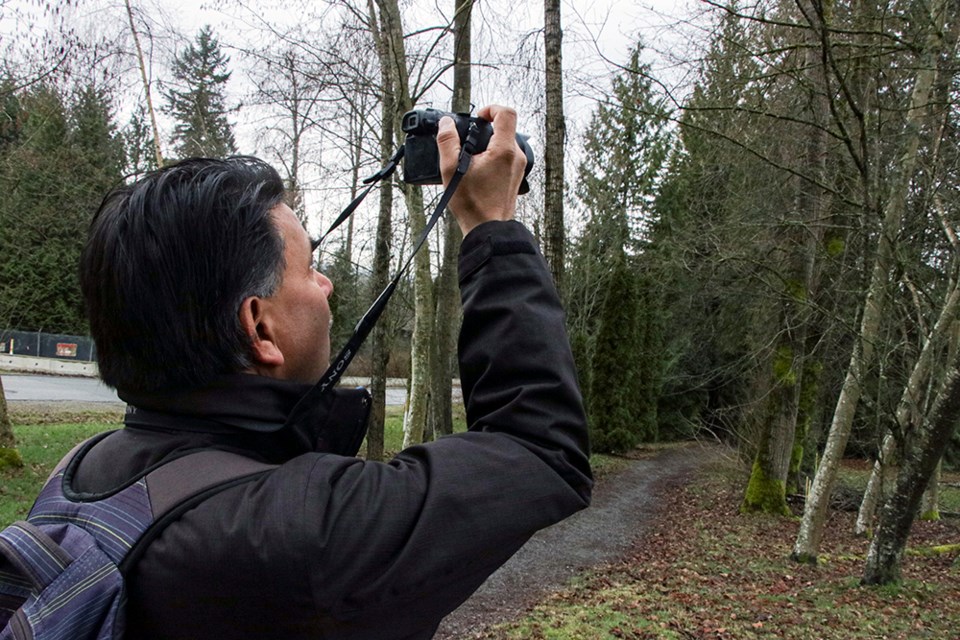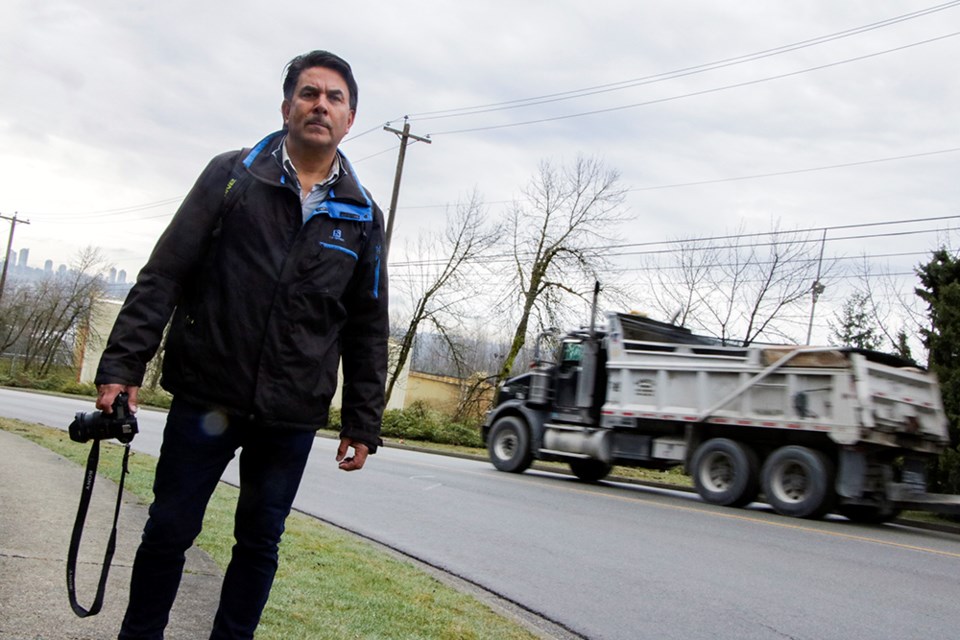The intersection is filled with the pulsing wail of heavy-duty brakes bringing a hulking dump truck slowly, fitfully to a halt. The driver is careful to ensure the truck comes to a full stop before, with a hiss of air, it kicks off again, entering the intersection.
Burnaby Mountain resident John Preissl cheers the subtle victory in that truck complying with a stop sign along Underhill Avenue.
For years, the narrow road has guided hundreds of heavy, double-length dump trucks full of sand up and down a slight but persistent slope, north from Lougheed Highway to Burnaby Mountain’s most contentious property – Trans Mountain’s Burnaby Terminal.
Laundry list of complaints
Preissl and his neighbours have been increasingly frustrated with that traffic. For some, it’s part of a larger opposition to the Trans Mountain expansion project. For other neighbours, otherwise supportive of or ambivalent about the pipeline, it’s about concern for safety in their community and the feeling of intrusion from these heavy vehicles.
Chief among their complaints, neighbours say they’ve seen speeding trucks driving, including in the two 30-kilometre-per-hour zones in the area.
Several neighbours have also complained of trucks “blowing through” the three-way stop at Underhill and Forest Grove Drive. Preissl admits it reflects common (albeit illegal) driving habits – slowing but not stopping at stop signs – but he says the danger from heavy trucks hauling double loads of dirt is far higher than it is from lighter vehicles.
“We just haven’t seen the respect that we were hoping for when it came to construction traffic in our neighbourhood,” says one neighbour, Kristin Vandegriend. “We have young kids, so we’re just really aware of the importance of safety.”

One resident, Rosa Delgado, says the roads weren’t wide enough before the construction began, spurring all the traffic of large trucks. Indeed, the NOW observed several trucks driving on a sidewalk along Underhill heading south from the terminal as they passed northbound traffic.
It's not just about safety; neighbours also complain of nuisances in the area. Vandegriend says she often hears the thunderous rumbling of engine brakes, despite Trans Mountain's traffic management plan that bans their use in residential areas. Neighbours also complain of long lineups of trucks parked along Underhill, waiting to get into the terminal and holding up traffic.
“It’s hard to trust that they are going to follow laws and regulations regarding the environment and all other safety issues associated with the project when they can't even get their traffic safety under control,” Dana Johnson, one neighbour, says in an email to the NOW.
Reluctant traffic police
Led by Preissl’s example, residents in the area have become reluctant, unofficial traffic police, documenting their concerns with their camera phones. The group has at least managed to become a thorn in the toe of the giant, which appears to have bowed to some of the laundry list of complaints the residents have raised.
But Preissl has also noted what he sees as intimidation tactics: Security guards filming residents documenting their concerns. A NOW reporter and Preissl were filmed by a security guard recently as Preissl took photos of traffic near the entrance to the terminal.
That’s something that causes those residents to think twice, according to Preissl.
“I’m used to it. … A lot of people don’t want to be here today. They don’t want to speak up,” Preissl says from the intersection of Underhill and Forest Grove Drive. “They’re actually afraid because of Trans Mountain and their injunction zone.”
Unshaken, Preissl approaches and strikes up a friendly conversation with the Trans Mountain employee, who tells Preissl the filming is only in case people break in or attempt to break the court’s injunction against disruptive protests.
Trans Mountain hears their concerns
In an email statement, Trans Mountain says it and its contractors are “sensitive to the movement of commercial vehicles on all city streets and remain committed to public safety.”
“Every effort is made to minimize the impact near residential neighbourhoods, especially with the increased traffic associated with terminal construction. … The team is working with local law enforcement to improve road safety and determine whether improvements need to be made,” reads the statement.
The Crown corporation has responded to some of the residents’ issues.
A few, such as trucks not stopping at stop signs, speeding and the long, disruptive lineups on Underhill, had gone away by the time a NOW reporter visited the area with Preissl, after he had complained of the issues to various authorities and to Trans Mountain.

But Preissl did notice a few persisting issues, as well – trucks without covers over their loads of sand and driving on the sidewalk to name a couple.
After weeks of sending photos and complaints to the Canada Energy Regulator, the successor of the National Energy Board, the regulatory body told Preissl in an email they were “looking into the matter.” A spokesperson for the CER did not respond to a request for comment from the NOW.
Despite the group’s successes, Preissl isn’t optimistic drivers will toe the line for long. And Vandegriend says it shouldn’t be the neighbours’ responsibility to make sure they do, either.
“That’s a lot to have to take on or worry about,” she says, “especially when you’ve got so much else going on in your life, when you have to police this massive organization that should have the resources to be able to do that.”



